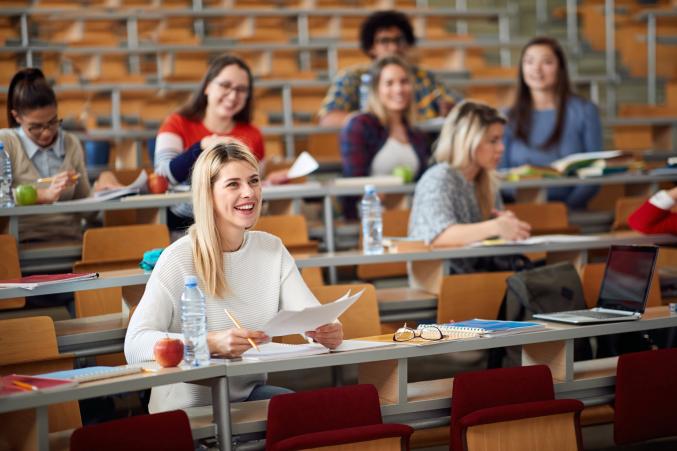Foto: Europäische Schule Rhein Main
Schools, colleges, and unis in Frankfurt Rhine-Main
It's important for newcomers to find the right school for their kids. Or the right university. There are lots of great options out there, both public and private.
German schools are about more than just learning a second language and experiencing a foreign culture. If you enroll your child in a German school, it can help you and your child to integrate into the local community. On top of that, the public education system is free of charge.
The German school system has a good reputation when it comes to academic standards. The main issue with the German system is the short hours (primary schools usually finish at noon), lack of flexibility and lack of programmes for gifted and remedial children. In Germany, it's down to the state government to run the school system. In response to the above shortcomings, the State of Hesse has introduced a series of educational reforms. As a result, the high school curriculum was overhauled and afternoon classes were introduced. Another big change was to do with substitute teaching. Hessen introduced new legislation to stop classes being cancelled (and students sent home) due to a lack of human resources in schools. With students now spending longer days at school, many schools are offering hot lunches. It's still the case that most German schools don't offer organised sports teams and other extra-curricular activities. Instead, these are provided by a huge number of clubs (Vereine). It's also worth mentioning that the German school system expects parents to play an active role in their child's education. At the primary and middle school levels, parents should expect to spend about an hour a day helping their children with homework on average.
Partner Portrait
ESRM – A Unique Path to Excellence
Founded in 2012 near Frankfurt, the European School RheinMain (ESRM) is the first accredited private European School and a non-profit institution dedicated to providing accessible, high-quality, multilingual education.
Partner Portrait
Welcome to ISF International School Frankfurt Rhein-Main
From Kindergarten to Grade 12, ISF offers high-quality education paired with a vibrant range of activities and events.
Partner Portrait
Master German - Discover Germany
“German cases feel like an intricate puzzle and it’s not always easy to grasp which case fits each situation”, says Nadiia from the Ukraine.
KINDERGARTEN
Germany has a great network of pre-schools. After all, the idea of the kindergarten first came from here, created by German educator Friedrich Fröbel in 1840. Kindergarten starts as early as age three and goes on until age five. It's not part of the regular public school system, so there's a fee. Tuition is often based on income, but fees are usually not expensive. Kindergarten in Germany is all about helping kids to develop socially and to build up their structured play, arts and crafts, music and coordination skills. Children aren't taught "learning ready" skills like the alphabet or counting. Kindergartens are often run by churches, social organisations or private companies.
GRUNDSCHULE
All children aged 6-10 are required to attend a primary school (Grundschule). Here they learn the basics, like reading, writing and arithmetic, as well as local history, geography and biology. It's worth noting that, unlike in some other countries, students also have religion classes. As well as their homeroom teacher, they also have a separate music and sports teacher. Students are given up to an hour of homework a day.
In the child's final year (4th grade) in the Grundschule, parents and teachers get together to decide on the child's next level of schooling. If a child shows the academic ability to succeed at university, they will move straight onto high school (Gymnasium). Students who need another two years can attend middle school (Förderstufe), after which they can choose between the Gymnasium and intermediate schools (Hauptschule or Realschule). This can be a really stressful time for parents whose children aren't initially offered a place on the university track. But remember, the teacher recommendations aren't set in stone and can be appealed.
Partner Portrait
ibms – International. Bilingual. Montessori.
Bilingual education according to the Montessori concept in the centre of Frankfurt
HAUPTSCHULE
The lowest level of education in Germany is the general school (Hauptschule). It starts in the fifth grade and goes through to the ninth. A Hauptschule is a school where students prepare for jobs that require vocational training and continue learning basic subjects, as well as English. Once a student has finished the Hauptschule, they can then go on to a vocational college, which usually lasts about two years.
REALSCHULE
A Realschule is a step up from a Hauptschule. Here, students get to grips with the basics, preparing them for mid-level roles in business or a technical trade. If a student has done well at a Realschule, they can also transfer to a Gymnasium.
GYMNASIUM
This is the highest level of secondary education in Germany and prepares students to enter university. Gymnasium lasts for 8–9 years and students learn German, maths, physics, chemistry, geography, biology and history. Students have to start learning a foreign language from Year 5 onwards. This is usually English, but you can also choose Latin or French. Students can add a second foreign language in 7th grade and a third in 9th grade. In their final years, students focus on specific subjects. They take week-long exams in their last year to get their Abitur, or high-school-leaving certificate, which allows them to apply to university.
GESAMTSCHULE
A comprehensive school (Gesamtschule) combines all three types of high school. First introduced in the 1960s, this type of school allows students to switch between different tracks without changing buildings.
Aroon explains
Private vs. State Schools in Germany
International and Bilingual Schools
International schools are accustomed to dealing with children from all over the world and with varied linguistic backgrounds.
Bilingual Preschools and Kindergarten
Playing with other children and learning a new language at the same time is what many parents want. With the right concept, this is easy to do.
Bilingual Public Schools
Over the past several years, public schools in Germany have begun to intensify their bilingual offerings.
Schools with different languages
School education with a focus on an international language gives children a deeper understanding of a country’s cultural characteristics at an early age.
Higher Education
Hessen has 21 public institutions of higher education, located in Darmstadt, Giessen, Frankfurt, Fulda, Kassel, Marburg, Offenbach and Wiesbaden. All the institutions are happy to welcome international students.
Adult Education
The Volkshochschule (VHS) Frankfurt am Main is the largest provider of adult education in the Rhine-Main region and one of the first places many newcomers turn to learn German













